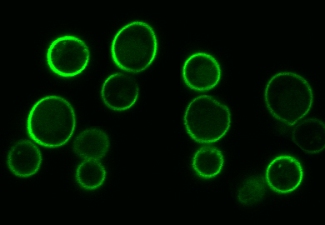The effects of the lack of potassium in the Cell

Potassium is the major intracellular cation in most living cells. This cation is necessary for many cellular functions, such as regulation of cell volume and intracellular pH, maintenance of stable potential across the plasma membrane, compensation of negative charges in many macromolecules, protein synthesis, and enzyme activation.
Thus, transport of potassium is a key mechanism in nerve transmission, and potassium depletion in animals, including humans, results in various dysfunctions. Plants are particularly rich in potassium and this cation, which is rapidly depleted from the soil under heavy crop production, must be replaced by using chemical fertilizers. Despite its many crucial roles, the precise molecular targets that would justify the importance of potassium in life are far from being fully identified and characterized.
Potassium is also a key nutrient for yeast cells, such as the baker’s yeast Saccharomyces cerevisiae, a very important model in biological research. This yeast is endowed with a powerful potassium uptake system that allow grow even when the environment contains very low amounts of potassium (<2 mg/liter), to achieve an intracellular concentration that can be 10000-fold higher than that in the external medium. If potassium is completely removed from the medium, yeast cells cannot grow. However, the exact cause(s) for this drastic effect were unknown.
During the course of an international program coordinated by our group, we developed a standard growth medium that completely lacked potassium. We considered that this growth medium, combined with a deep transcriptomic analyses using DNA microarray technology, provided an excellent way to learn how a sudden depletion of potassium in the medium could affect gene expression, thus providing hints about key cellular processes that could be negatively affected by lack of potassium.
We discovered that short-term potassium deprivation has dramatic impact in the mRNA level of over one thousand genes, that is, more than 15% of the entire yeast genome. Lack of potassium drastically alters sulfur metabolism (mainly Methionine and Cysteine metabolism), triggers an oxidative stress response and results in intracellular ammonium accumulation that enters the cell through the potassium transporter. We also observe a remarkable halt in the expression of genes required for ribosome biogenesis and translation.
Finally, we observed a decrease in expression of diverse components required for progression through the cell cycle and detected a blockage in molecular structures (septins ring assembly) that are necessary for budding and cell division. These defects may explain the halt in proliferation observed upon depletion of potassium.
Therefore, a shortage of potassium in the environment triggers an acute transcriptional response, which covers different aspects of the cell biology so far unexplored, and whose investigation will likely reveal novel functional roles for this cation. In addition of the relevance of these findings for biotechnological applications using yeasts, they are likely to be relevant also for plants and animals.
References
Barreto L, Canadell D, Valverde-Saubí D, Casamayor A, Ariño J. "The short-term response of yeast to potassium starvation" Environ Microbiol. 2012 Sep 7.


